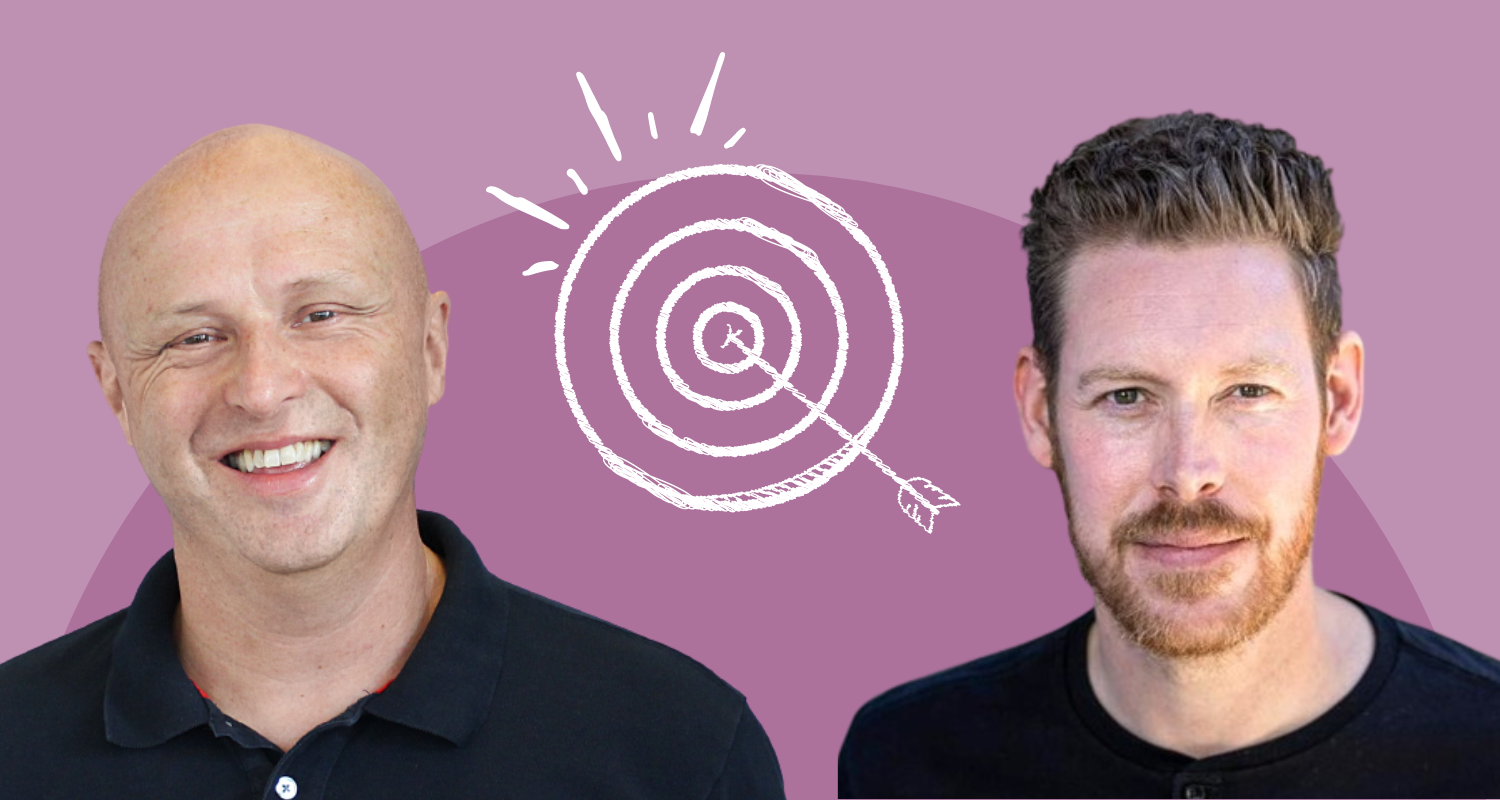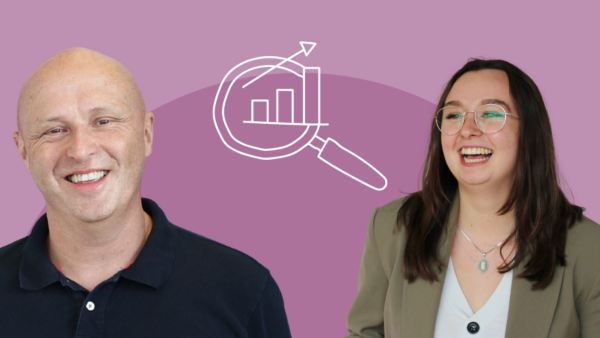Hi, my name’s Dr Paul Brewerton, the strengths guy, Doctor of Organisational Psychology and Founder and Chair of Strengthscope. Today we have on the show a long-time collaborator and revolutionary force in the world of work, Josh Allan Dykstra.
Hey Josh!
Josh is a recognized thought leader on the future of work and company culture design. He is the CEO of #lovework, a tech platform that helps middle managers in large organizations lead hybrid teams with amazing performance. His articles and ideas have been featured by Fast Company, Forbes, and The Huffington Post, and he’s worked with some of the most iconic brands in the world (Apple, Sony, Genentech, Microsoft, among others). He holds an MBA in Executive Leadership from the University of Nebraska-Lincoln. And you’re talking to us today from Denver, Colorado, right?
I experience you as a challenger, a critical friend, a little (a LOT 😉) of a revolutionary. And taking that challenger position in a busy and quite conservative marketplace is relevant right because what you do Josh is hard. Helping people and employers get to a place where they love work more. And measuring the impact of what you do is even harder.
But there walk all of us. All of us in HR, L&D, OD, all the subsets of the people professions. It’s difficult to measure the impact of our work in a credible, business-friendly, commercially relevant way. So today, I’d love to talk about all of this and more, so that we can provoke some thinking and discussion around return on investment measurement in the people professions.
First though, I’d love to hear a bit more about your story, from birth to #lovework, in under 5 minutes. Including your highlights reel please. You up?
I was born in a tiny town, 1300 people, in the literal middle of nowhere in the literal middle of the U.S. I always felt a bit like a big city kid somehow displaced in a small town, but my family was amazing. My parents are deeply entrepreneurial and are big thinkers. They are incredibly nurturing, and always encourage me to follow my dreams.
They started planning a small town escape around the time I started high school, and got us out by my senior year when we moved to a town in northern Colorado; not a big town, but big for us—my new high school was twice as large as my hometown! That move was huge for me… I was always kind of the nerdy kid growing up, but when we moved I remember thinking “No one knows me here! I can be whoever I want.” So that’s what I did; I became the outgoing, sensitive singer/songwriter new kid. I bought a new acoustic guitar, joined the Student Council, and had a great year!
I wanted to go to the West Coast of the US for college, but couldn’t get enough scholarship money to any of the schools I wanted, so I landed at a private university in Denver. By the end of my first year, I was in the school’s exclusive Leadership program and got chosen to lead the most visible music program in the school, which I tripled in size over the next couple years. I had a great few years. That was when I really started fighting with the status quo… the adult in charge of the program and I didn’t see eye to eye, so he fired me before my last year which was pretty hard.
Got married right after college, lived in Denver a couple years, and then we decided to move to Los Angeles. Back then I thought “rock star” was the correct life path for me, and my new wife was considering acting, so LA seemed like the right place! We ended up being in LA for about a decade, and that’s really where we “grew up.” That’s where I started my business, that’s where our kids were born, etc. But back around 2006-2007, I realized I didn’t want to do music as a career, but I noticed something important that would change my life—I noticed that most people don’t like this thing called “work.”
As I did more research, I realized just how big this problem is, and how much it just “hides in plain sight.” By that I mean: almost everyone has to work, we all have a job, but somewhere between 70-80% of people feel “meh” about it (or worse), and then we all just kind of accept that this reality is somehow the best we can do.
This fact continues to blow my mind, 15 years later. Maybe I’m just really, really stubborn, but I refuse to believe that this is the best we can do.
So, over the last 15 years I’ve done almost anything one might imagine to try to help work not suck for as many humans as possible… consulting, workshops, assessments, the usual. I published a book in 2012 and did a TED talk in 2018.
And then a few years ago I got pretty obsessed with building some technology to help fix this problem; that platform is called #lovework and we can talk more about it if you like!
Now, because I’m the strengths guy, I’m going to ask you about strengths (and I understand you focus more on the word energy, which I love by the way) – what are your standout strengths (or energies) and how have they shown up in your career so far? I’d love to hear about how you’ve role crafted towards your strengths…
Yeah I know we have a shared love of this topic! The strengths approach is what really turned my head towards this career in the first place; I did my first strengths assessment in 2006, and the notion of “do more of what’s right with you” instead of trying to “fix all the things that are wrong with you” just lit me on fire! I devoured everything I could in the world of positive psychology.
These days I do like to tilt the conversation towards energy—a huge part of why I know to do that is because of you!—because I think it’s still vastly unexplored for most people. Most people understand “strengths” as competencies or talents, and most workplaces actually do a decent job of obsessing about competencies, but almost zero workplaces have tapped into optimizing for what energizes people and puts them in flow states.
A few standout energizers are Strategic Mindedness, Initiative, Creativity, & Self-Confidence. Most days my job utilizes all the things that energizes me quite a lot, and I would say that’s because I’ve been pretty intent about not accepting anything less and doing a TON of A/B testing over the last 15+ years.
And how about your risk areas – strengths in overdrive and/or drainers – what have you done/do you work on with those?
I think the Strengthscope concept of energizers in overdrive is one of the most powerful ideas I’ve ever learned. Seriously. Understanding how easy it is to go into overdrive in an energizing area has become completely fundamental to me learning how to respond to the world in a more emotionally intelligent and constructive way. I am constantly trying to adjust my “internal dials” around my need for details, my desire to be creative, my excitement to persuade… I think this singular concept has made me 1000% more effective with others. I’m so very grateful for this idea.
OK, let’s move on to talking ROI. Can you map the territory for us a little with measuring the impact of people-based interventions? First, why is it so important do you think?
First let’s talk a little about measurements in general. I am an idealist at heart, but as I’ve gotten older, I’ve learned to become intensely pragmatic about my idealism. As in, how do we create a better world—like, actually, for real, inside the constraints of today—is what I obsess about these days.
And as I look at the state of things, I see that measurements often define what matters. Measurements are some of the most dominant framing language across our societies and cultures.
For example, one of our most primary framing measurements GDP, which is fundamentally a construct based in consumerism. When we use that measurement as a proxy for “success,” we are naturally leaving out a whole bunch of other metrics. When we talk about quarterly earnings cycles or shareholder returns, this too omits many things that matter deeply to us as humans, like the value of connection and empathy and care, but because those are the de facto measurements, they become signals about what we think matters MOST.
So if humanity is smart, we will continue prioritizing building an entirely new field of measurements. This is already happening, of course—we’ve now got entities and countries measuring Happiness and Well-Being and related things—but we’ve got a LONG way to go until that becomes the dominant frame of how we organize the world.
In general, our current organizing story is the profit-centric one, full stop. And this makes everything pretty hard.
And why do you feel it’s so hard? And in fact, is it so hard (it seems to have a rep that it is for most people professionals at least)?
It’s no secret at this point in history that taking care of people means a better business long-term. We’ve had decades of research on this at this point. Look at engagement research. Look at Firms Of Endearment. Look at the work on psychological safety. Everything we study tells us that when we optimize for the energy and well-being of people, everything works better over the long term. Anyone that’s paying attention knows this; it’s utterly conclusive.
But you and I and everyone I know in our space still struggles to sell it! Why?
The problem has to be something in the current system.
The challenge goes back to framing metrics. Here’s the biggest problem: our primary business metrics are overwhelmingly short-term and people are inherently long-term investments.
Compare a quarterly earning cycle—3 months long—to a human career that will last 3 or 4 decades. These cycles are completely misaligned, and they both can’t win.
This puts executives in a really difficult position; frankly, keeping their job in the short term often means emphasizing different things than investing in the long term. So the tyranny of the urgent wins, short-term metrics get prioritized, and this means humans only get deeply invested in when we see a major labor-centric market cycle like we saw a couple of years ago with The Great Resignation.
So most of the time, people who do what we do are selling upstream into a system that’s not truly incentivized to listen to us.
It’s not really any one person’s fault, it’s just a really faulty system.
Perhaps you could bring some examples of when you’ve measured ROI for your clients. I’ve read some of your impact reports and they’re really good. The one from the Colorado healthcare system cardiology unit really pops. For me, I think it’s the multiple measures, the qual and quant approach and the depth of the work you did.
This is one of those things that’s just night and day different as I moved from a service-based business into a tech product business. When I was doing consulting and certifications, the most I had to worry about measuring was a feedback form after the training event. But when you’re a tech company, the default expectation is that everything is measured.
Now, that’s not to say that tech companies measure the right things; in many cases they don’t. But the default EXPECTATION of a tech company is that you are somehow measuring EVERYTHING. And this expectation is quite difficult, and probably a little crazy.
So we decided early on that we would NOT measure everything. We decided that organizations already have too many “vanity metrics,” and we would focus only on the key LEADING indicators of outcomes we know great orgs want: things like more engagement, hanging on to key talent, and more productivity/performance.
Our driving question was: what are the PRACTICES that create those things? And we decided to measure just those, so we ended up with a few questions about burnout, a few about psychological safety, and a few about what we call Energy Intelligence. From just these 3 categories, an org moves the needle on all the other good things they want.
Over the first 18 months of paid customer pilots we took #lovework into 11 organizations, 18 teams, and approximately 600 people over a bunch of different industries from health care to tech to market research to insurance and discovered that our practices move 96% of our measurements in a positive direction in just 90 days.
We also did a great control group study with a couple hundred people, where some were doing #lovework and some weren’t, and we got some crazy deltas off this study, from 4-11%. For example, in the psych safety category, it was a clear fork in the road, with the control group getting 5% worse over 90 days and the #lovework group getting 5% better.
I think the results I’m most proud of, though, are the more qualitative things that come out in people’s comments. They notice higher energy levels, they say it creates huge shifts in communication, they report better mental clarity, and say it helps everyone perform better. These are little things that aren’t little. These are the things that make people say they love their work.
Getting into the detail a little, should we try and put a financial number on the impact of people interventions do you think? What are the challenges? If not money, what else works by way of credible reporting to client stakeholders?
I’m not sure the current system of work will respond to anything BUT a financial number. It’s the only thing that puts the ball between the goalposts right now.
There are big challenges here, though, too. Because of the misalignment we talked about earlier, there often aren’t enough incentives in the system for leaders to prioritize human-centric work, even if they really want to.
This has frankly been shocking to me, how difficult it’s been to get organizations to track things alongside our data. We can usually get retention data, but we’ve really struggled to get engagement data, and we’ve been completely unsuccessful so far at getting organizations to track internal KPI data that matters to them in order to correlate it alongside our Impact data.
Then, it becomes this frustrating Catch 22—org leaders a few levels “above” the teams who are doing #lovework want us to produce a bunch of data showing the positive impacts of the program, which of course we’d love to do, but the org’s bureaucracy is actively preventing us from getting the data they want to see!
And of course this data tracking thing doesn’t really have a clear home in the org—is it IT’s problem? HR? nobody seems super clear about this yet—is all happening in the spaces between all the other work that needs to get done, which is to say, it goes to the bottom of the to-do list.
It’s not a great situation for anyone, and I am starting to believe that only deep, systemic, structural changes can fix it in any meaningful way.
Thinking about your overall journey with this topic, what hasn’t worked for you and what have you learned?
I just painted a pretty bleak picture, but executives could actually fix this pretty quickly.
It’s a positive thing about the kind of hierarchy most orgs use—if someone with enough authority wants something done, it can move very fast.
So what we need are senior leaders to step in and support this work.
Also, the Chief People Officer needs to be seen as the most important partner to the CEO, and forgoodnesssake they do not report to Ops or Finance. NOTHING in your organization happens without people, so let’s start prioritizing them properly.
So with all that in mind: the successes, the learnings, the experiences, what are your top tips for measuring people impact for any people professionals listening?
Maybe this is a little controversial, but I actually don’t think leaders need more measurements to decide to do people work. If you still need convincing, the evidence is out there. Go find it. Or ask Paul or ask me, we’ll help you find it.
But let’s be honest—you went through the pandemic, same as I did. You understand the value of having a more flexible workplace, where people trust each other, where people enjoy working together. So what needs to happen now is about identity.
If you’re a leader, you need to decide what kind of workplace you want to create.
Do you want to be a place that is known for giving people energy instead of extracting it? Do you want to be a place that’s known for taking care of people? Who are you and what are you going to be about? Decide!
You can play the profit-at-all-costs game, but that game has disastrous consequences, you know it, and I know it, so I’m asking you to please play a different game.
Once you’ve decided to make this a proper priority, I think you should measure what we do—psych safety, burnout, and energy—and then really get your arms around your internal people data so you can properly correlate inputs of the people work you do with outputs on your KPIs. This shouldn’t be as complicated as it is right now.
OK Josh, thank you, I have one more big existential type question. If you met younger you in a parallel universe, what advice would you give your younger self based on your experiences?
3 things come to mind.
First, be more careful with business partners. There’s some old saying, probably from the Wild West, that goes “Trust God, but tie your horse to the post.” Partnerships are hard, and they are fluid and evolve over time. You can trust people and still create agreements that make it easier for things to change and less hassle when they do.
Second, I would say it’s all going to be fine. Life has some crazy twists and turns, but it’s all happening for you, not to you… if you can stay present enough to notice that.
Third, I’d tell him to do a big-ass fundraise in 2021. 😉
Josh, do you have any resources you’d suggest? What have you found helpful and profound in your journey that you’d recommend to others. Either about measuring people impact or just in general about creating positive productive workplaces?
I really want people to get exposed to more ideas about alternative ways to run organizations. My favorite place for this is my friends at Corporate Rebels.
If you want a better theory of organizational design, it’s quite simple: orbit everything around what energizes people. I talk about this in my TEDx.
And lastly I would invite people to please check out our podcast, called The Work Revolution! It’s for work revolutionaries of all kinds. Please join us.
- The Work Revolution — New Podcast! Get on the list here.
- Corporate Rebels
- Josh’s TED Talk
- Josh’s Paper Book
- Josh’s Audible Book
And what are the best ways to get in touch with you?













